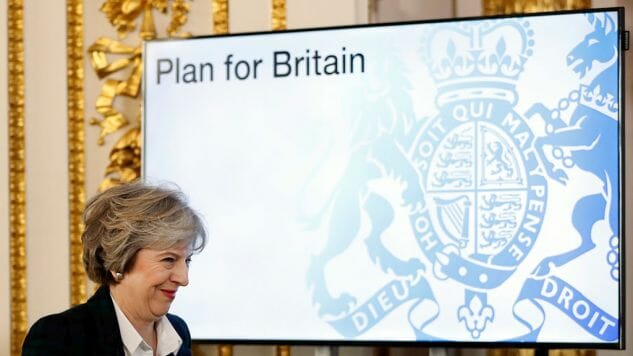She’s Leaving Home: Britain’s Ridiculous Brexit Plan
What Will Remain When Britain Leaves?

The British Prime Minister Theresa May made a speech today announcing how the U.K. was going to Brexit the hell out of the E.U., and let me tell you, it was a piece of work: wanting everything, giving nothing. Far from being a mellow statement about disentangling from the political machinery of Europe, the speech was a window into how politics in the United Kingdom work. With its claim of being simultaneously strong and put-upon, the British government is just about ready for a membership on Reddit.
To watch this speech was to see Britain claim it was going to stay in the world, but shrink away from it at the same moment. I was reminded of a clergyman committed to doing good but concerned about how his plums would fare if he was away too long on protests.
What Britain seeks is not partnership with Europe, but another day in the fading twilight. Like an aging beauty holding a gun, the nation dreams of powers and principalities it can no longer have. The recent announcement, with its combination of weird posturing goofiness, half-assed threat, and uncalled-for pride, is contemporary British democracy in a nutshell. As far as the tastes of the political class goes, it’s tone-perfect, but by the standards of reality, it’s tone-deaf.
As The Guardian reported:
Theresa May has committed to putting the final Brexit deal to a vote in parliament in a speech on the UK’s future relationship with the European Union, and insisted that if she failed to get what she wanted no deal would be better than a bad deal. The prime minister’s pledge to hold votes in both the Commons and the Lords came alongside a stark warning to European countries that any attempt to inflict a punitive deal on the UK would be an act of “calamitous self-harm.”
Since the Brexit vote, the Parliament of the United Kingdom and its reigning Tories have grasped in the dark for some way of withdrawing with dignity. But it’s far too late for dignity, as the parson said to the shepherd trapped in a wine barrel.
Still, the Prime Minister tried. May hinted, if pressed by the tyrants across the Channel, she would gut taxes and invite in the rowdy investor class—implying, of course, they were not already there, and not already in power.
In other words, “Nice European Union here; shame if anything happened to it.” But this is posturing of the delete-your-account variety. May has no leg to stand on, as she engages in what the teens and newspapers—okay, just the newspapers—are calling “Hard Brexit,” which sounds like the title of a major John Woo movie from the Nineties.
On the topic of European secession, May’s tack disallows for any hokey-pokey: There will be no one foot in, one foot out, as far as London is concerned. That means whenever Brexit comes, it comes wearing the face of winter and wilts all the branches: free immigration goes; the single market goes; the European Court of Justice’s jurisdiction goes; the customs union goes; everything must go, and all that is European and Union must pass from the sunless shores of Albion.
In the realm of politics, there’s not a lot that’s surprising about May’s commit to follow through on what the referendum decided. But in another, more accurate sense, it was a triple-layered sigh of resignation to the final downgrading of the United Kingdom. Jeremy Corbyn, leader of the Labour Party, tweeted, “We cannot let @Theresa_May use Brexit to turn Britain into a tax haven on the edge of Europe and create a bargain basement economy.”
Like Obamacare, the European Union is rife with neoliberalism, but EU membership does more good than harm. Britain has always been coy about being in Europe; even when they were there for it, they weren’t really present, i.e., the Reagan approach. The U.K. had, as the phrase goes, a “special something” between them and the European continent.
-

-

-

-

-

-

-

-

-

-

-

-

-

-

-

-

-

-

-

-

-

-

-

-

-

-

-

-

-

-

-

-

-

-

-

-

-

-

-

-








































